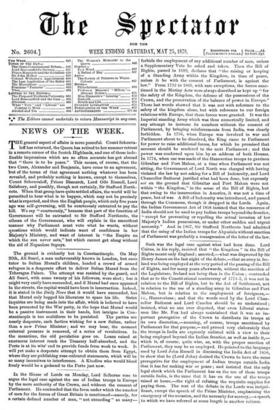In the House of Lords on Monday, Lord Selborne rose
to argue the legal case against the use of Indian troops in Europe by the mere authority of the Crown, and without the consent of Parliament. He contended that the form under which the number of men for the forces of Great Britain is sanctioned—namely, for a certain defined number of men, " not exceeding" so many— forbids the employment of any additional number of men, unless a Supplementary Vote be asked and taken. Then the Bill of Rights, passed in 1689, declares that "the raising or keeping of a Standing Army within the Kingdom, iu time of peace, unless it be with the consent of Parliament, is against the law." From 1732 to 1866, with rare exceptions, the forces sanc- tioned in the Mutiny Acts were always described as kept up " for the safety of the Kingdom, the defence of the possessions of the Crown, and the preservation of the balance of power in Europe." These last words showed that it was not with reference to the safety of the kingdom alone, but with reference to our foreign relations with Europe, that these forces were granted. It was the Imperial standing Army which was thus numerically limited, and any attempt to increase its numbers without. the consent of Parliament, by bringing reinforcements from India, was clearly forbidden. In 1734, when Europe was involved in war and Parliament about to be dissolved, the King came to Parliament for power to raise additional forces, for which he promised that account should be rendered to the next Parliament ; and this power was conferred upon him by an address of both Houses. In 1774, when use was made of the Hanoverian troops to garrison Gibraltar and Port Mahon, at a time when Parliament was not sitting, the Government of Lord North was charged with having violated the law by not asking for a Bill of Indemnity, and Lord Chancellor Bathurst justified what had been done, but expressly not on the ground that Gibraltar and Port Mahon were not within " the Kingdom," in the sense of the Bill of Rights, but that owing to the insurrection in America, it was not a time of peace, but of war. A Bill of Indemnity was introduced, and passed through the Commons, though it dropped in the Lords. Again, the Indian Government Act of 1858 insisted that the resources of India should not be used to pay Indian troops beyond the frontier, " except for preventing or repelling the actual invasion of her Majesty's Indian possessions, or under other sudden and urgent necessity." And in 1867, Sir Stafford Northcote had admitted that the using of the Indian troops for Abyssinia without sanction of Parliament was probably a transgression of the letter of the law.


































